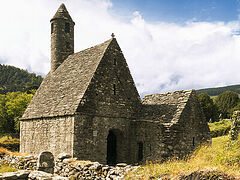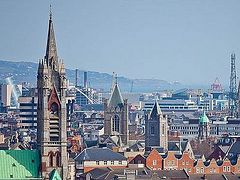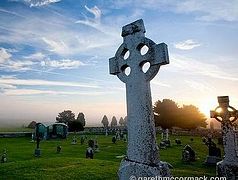Fr. John Kazadoev, rector of St. Nicholas Church in Galway, Ireland (the Diocese of Sourozh), was born and raised in Klaipeda, Lithuania. After graduating from high school he entered Vilnius University (the chemistry department). In 2009 he moved to Ireland in search of work. There he began attending the Holy Trinity Church in Cork, and its rector, Fr. Nikolai Evseev, contributed to his spiritual development. He began assisting Fr. Nikolai during services and decided to become a priest. He completed a correspondence course in theology at St. Tikhon’s Orthodox University of Humanities (2011—2014). In December 2017 he was ordained deacon by Archbishop Elisei of Sourozh at the Dormition Cathedral in London and in August 2018 he was ordained priest by Bishop Matthew of Sourozh at the same cathedral. We talked with him about the difficulties Orthodox parishes in Ireland face, relations with the State and the non-Orthodox, problems of integration of his compatriots into Church life, connections with the motherland and myths about “the Emerald Isle”.
—Orthodoxy is reportedly one of the fastest growing religions in Ireland. Is it true?
—Judging by the data published by the Central Statistic Office in 2016, Orthodoxy indeed has been the fastest growing religion in the Irish Republic since 1991. It is no coincidence, given the events in the former USSR. The first wave of emigres was followed by others and in a greater number. It should be noted that the flock of the Romanian Orthodox Church makes up one third of the Orthodox population of Ireland.
—Why is that?
—It’s no mystery. Finally having the opportunity to travel abroad, people try to improve the quality of their lives; and work in Ireland pays much better than at home.
—Please tell us about your parish. Are your parishioners Russian emigres of different waves and their descendants, or are there representatives of other nationalities, including Irish converts? What is the ratio? Is the community large?
—I pastor three parishes—St. Nicholas in Galway, St. Tikhon of Moscow in Castlebar, and a new community in Sligo. They are all very different because they consist of people with different life experiences and cultures. Some are more active than others. Our conditions differ depending on the particular parish, and we have to adjust to rules that don’t depend on us.
St. Nicholas parish in Galway is situated in the city center, in a fourteenth-century Anglican chapel. It is a fine architectural monument. Tradition holds that Christopher Columbus prayed in it in 1477, so it is a special historic site, and people are drawn to this chapel. But our community is limited in its movements—we need to repeatedly agree on our service times, taking into account events held by the Anglicans. We can only worship on Saturdays, and it’s not convenient for everybody as some parishioners work on Saturday mornings.
We are looking for an alternative but it isn’t easy given the church’s location in the city center, and it is much easier to get there for those who don’t have private transportation. Offers for property outside the city aren’t applicable. We could rent something of own, but we don’t have enough funds. Paying the rent, utilities and the necessary insurance is extremely expensive, given the small number of parishioners attending services. Parishes outside Dublin have up to thirty parishioners each, so it is difficult to develop vigorous activities—but we don’t lose heart.
Through the initiative and activity of St. Tikhon’s parish in Castlebar and a local Catholic priest, and with the support of the Department of Education we obtained a classroom in a grammar school outside the city for temporary use. By our joint efforts, this room was transformed into church space where services are celebrated regularly. That’s a great relief, since it’s almost the only place outside Dublin where services were celebrated without intervals despite the restrictions imposed by the government because of the spread of Covid-19.
As for our parishioners’ nationalities, apart from our compatriots we have emigrants from the Baltic States as well as some Irish, Poles, Serbs, Moldavans and even Palestinians. For instance, there are several young Georgians in our Sligo parish who are unable to leave the city because they live in an immigration center—but participation in the Liturgy is very important for them.
People tend to consolidate in difficult life conditions—this bears fruit since the center of unity is Christ. Many political differences are pushed to the sidelines and you get added evidence that There is neither Greek nor Jew…, but Christ is all, and in all (Col. 3:11).
There aren’t many Irish converts among the parishioners of the Russian Church—these can mostly be found at the Dublin church.
—How do relatives of the Irish parishioners feel about the fact that a husband or wife, son or daughter, family member or acquaintance has “betrayed the faith of their ancestors”—Catholicism?
—At present there are no such people in our parish, but I can say that reactions are vary widely from approval to direct opposition; though in most cases it’s just indifference. Over the past twenty years, Ireland has changed dramatically. Though the Catholic traditions are still alive, they thrive in small towns and villages. There you can see whole families attending Mass, whereas in cities the majority of parishioners in Catholic churches are elderly. The faith of the Irish has grown cold, which was demonstrated by the results of the recent referenda on same-sex marriages and abortions.
—A few more questions on parish life. Tell us about your priestly activities outside services and those of your community. Do your parishioners take active part in parish life?
—We visit hospitals when local doctors and nurses come to us with requests from seriously ill people. As a rule, requests come from our compatriots. Most of them are unchurched people who turn to us as the last resort. It is comforting to know that people realize the need to repent of their sins and receive Holy Communion. But there are sad cases when relatives call too late, when the person is already unconscious.
Sometimes we are asked to perform a funeral service for someone who was baptized in Orthodoxy but wasn’t our parishioner. In most cases I am asked to baptize children, which makes me glad, but not many come to me fully aware of what Baptism is and why it is needed. But I’m fussy and don’t easily agree. People complain, but they have to delve into it to understand—there is much more joy after that! Though I’m joking, it’s a very important point—a conscious choice and understanding of the deep meaning of the sacrament.
Most priests abroad have to work secular jobs to provide for their families. I personally work full time in a private international company, in the department for the development of photochromic coatings for ophthalmic lenses. Sometimes I go on business, but this allows me to meet Orthodox clergy in the field and get to know them.
This business entails certain difficulties, a lot of time and energy, so I don’t always have the resources for activities outside services—especially in the parishes where we have no property of our own. You need to get to the service room, bring all that you need for the service, prepare the space and remove everything after the service. In such places we often have time limits and we don’t always have any space to talk with parishioners over a cup of tea. The journey alone can take up to two hours; and families with small children hurry home towards the end of the service to prepare for the start of a new school week.
So we have different situations in different places. In this respect it’s easier with the initiative at St. Tikhon’s at Castlebar. We have our own premises there albeit temporary, which has been transformed by the parishioners and their acquaintances. In the adjoining room we hold lessons (the fundamentals of Orthodoxy, Russian language and literature) and festivals. The rector is responsible for the parish and liturgical life. But the parishioners are also involved, and they have taken the initiative to organize the Russian school. Some people are actively involved in charity work, collecting and sending parcels with things and essentials to orphanages of Belarus and Ukraine.
—What can you say about the relationship between the Orthodox Church in Ireland with the State and the Catholic majority? You mentioned you rent Anglican buildings…
—The State is indifferent to us, as, in fact it is to Catholicism—the current ban on mass attendance at services only confirms this. A number of Catholic bishops recently petitioned the government with the request to consider the possibility of citizens exercising their constitutional right to freedom of religion and worship. As far as I know, there was no answer.
With regard to interfaith relations, we can say that Catholics and Protestants are friendly to us and try to help us. They often allow us to use their buildings for worship free of charge. At the same time, there are no attempts on their part to convert us. They respect our doctrines, and we should take into account that we aren’t their rivals. Our parishioners are few, so they have no reason to fear us.
—What problems do Orthodox believers and you as a priest face in everyday life in Ireland?
—Problems of this kind are related to moral issues—the foundation that is characteristic of conservative Christianity. The Orthodox Church is uncompromising in issues related to same-sex relationships, abortions, sexual education of children, etc. There are certain provisions that were stipulated in the Social Concept of the Russian Orthodox Church; but there are special cases, and they are not common.
Irish society has become extremely liberal in the past twenty years. What was previously absolutely unacceptable is now a norm and a human right. This position on the issues of abortion can be heard even from practicing Catholics. If you openly begin to express your disagreement with the existing practice, especially in matters of free relationships, you may end up on the margins of society or even lose your job. We can’t say we are faced with a personal problem, but the above ideas are starting to be implanted in schools and at some point we will have to declare our strong protest, especially when it comes to our children.
—For Ireland Christianity is an ancient faith. Which of the early local churches, monasteries and holy places impressed you deeply? Where would you recommend an Orthodox pilgrim to go?
—Of the monasteries I would recommend Glendalough, founded in the sixth century by St. Kevin; St. Nicholas Church in Galway where we have served for a long time; St. Patrick’s holy well in Tipperary; and Croagh Patrick in Mayo. It has long been a tradition in our diocese to serve the Liturgy on St. Patrick’s mountain on the feast of the Transfiguration every year. After a two-hour climb and Holy Communion you feel a special spiritual experience and joy after participating in common prayer.
—One gets the impression that Ireland is a fairly calm place on the globe. Is this true?
—The Irish are a very friendly, cheerful and resourceful people. They seldom get discouraged. When you look at the resilience of the Irish, you understand who Prof. Tolkien based his Hobbits on!
It is pretty quiet here and time passes somewhat slowly. Sometimes you have to remind people of your existence, especially when it comes to social services. The only thing you notice is a different perception of time—an Irish hour lasts several normal hours, so there are sometimes problems with punctuality.
—Do you maintain communication at the parish level with Orthodox communities in Russia? Can the connection of the Russian community in Ireland with the motherland be called strong and active?
—There are some contacts—for example, with St. Elizabeth Convent in Minsk through the activity of our parishioners in Castlebar. We hope that it is just the beginning and in the future our ties will only expand and multiply. I personally try to maintain contacts with Orthodox clerics worldwide and I always invite those who wish to visit; so, if there is an opportunity, please come!
 An Irish farmer. Photo by Jim Richardson
An Irish farmer. Photo by Jim Richardson
—What astounded you the most in Ireland during your stay here? Did you have any myths and stereotypes about the country before you got here?
—From the point of view of the history of Christianity Ireland is a very unique country. It feels as if you could pick up any stone and immediately find some relic under it. The Lives of the Celtic saints are replete with unique narratives of extraordinary podvigs and testimonies of a living Christian faith. At one time Irish monasticism was at the center of European scholarship. We should study this heritage.
As for stereotypes, they mostly refer to everyday things and the Irish character, for example:
1. All Irish people are redheads.—That’s not true, but many do have red hair.
2. The Irish drink large amounts of beer and whiskey.—Yes, they are good at enjoying themselves.
3. Ireland is an eternally green island.—Mostly true. The main reason ois the rather warm air temperatures and heavy rains all year round.
4. There are plenty of sheep in Ireland.—True. Very warm and beautiful sweaters are knitted from their wool.
5. Irish music is unique.—It’s something everybody must listen to and appreciate, particularly live music.
6. Irish people are in no hurry.—For the most part this is absolutely true. They say: “However long the day, the evening will come” (meaning that bad times don’t last forever). This is their antidepressant!
7. There are lots of pubs in Ireland.—True. They are everywhere, almost at every turn. The fact is that the Irish hardly ever invite their guests to their homes and prefer to meet with their friends in pubs. Given that it constantly rains here, where else would they go?
There are also various myths—for example, about leprechauns and pots of gold, but I have to admit that I looked everywhere and never found any.
—What words from the Holy Scriptures inspire you or support you in difficult times?
—Come unto me, all ye that labour and are heavy laden, and I will give you rest. Take My yoke upon you, and learn of Me; for I am meek and lowly in heart: and ye shall find rest unto your souls. For My yoke is easy, and My burden is light (Mt. 11:28-30). And also, I will see you again, and your heart shall rejoice, and your joy no man taketh from you (Jn. 16:22).










